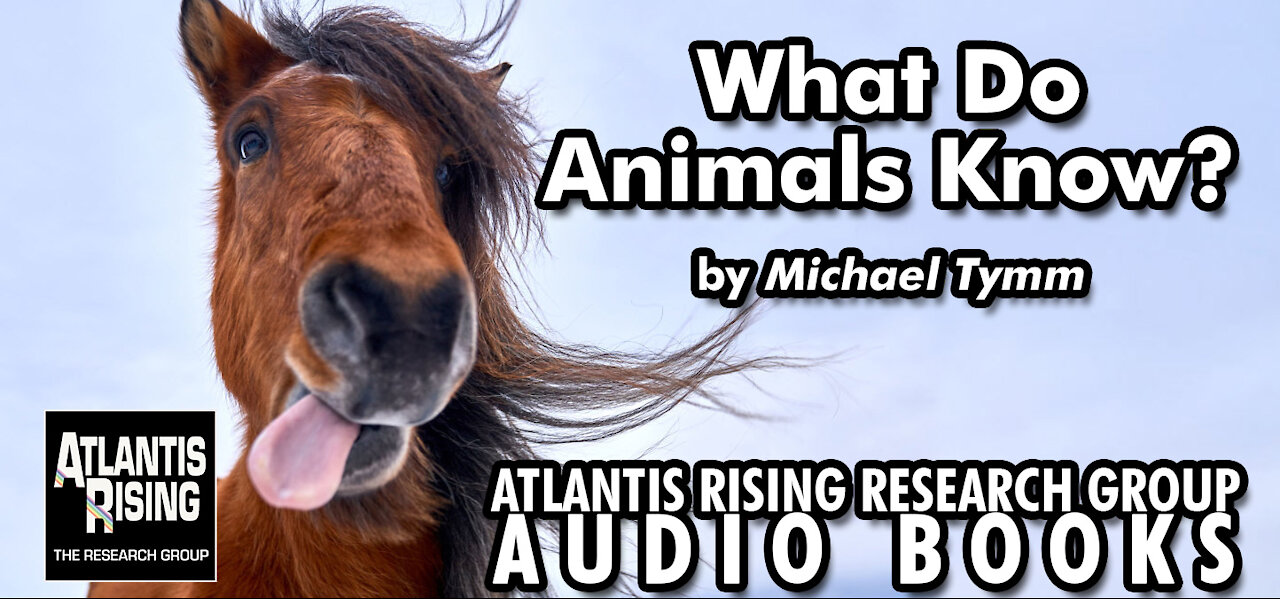Premium Only Content

What Do Animals Know? From Atlantis Rising Magazine
Visit Atlantis Rising Research Group at https://www.atlantisrising.com/
Atlantisrising.com
A few weeks before the Kentucky Derby some 25 years ago, the trainer for one of the leading contenders was interviewed on television and said that his horse was ready for the big race, not only because he was fast and fit but because he was smart and competitive.
I mused over that comment, wondering if some horses are truly smarter than others and if they really care about winning. If they are competitive and not just running hard because of their natural speed or because they are responding to the whip, does that mean that horses have egos? When they win, do they rejoice? When they lose, do they sulk and kick the stable door out of frustration? Is pride or self-esteem driving them, or is it simply that they understand that they might get an extra lump of sugar or a carrot by finishing ahead of the other horses? I further wondered if there is a positive correlation between intelligence and winning.
As I was writing for a daily newspaper at the time, I decided to explore the subject in my sports column. I hoped to get the answers to my questions “straight from the horse’s mouth,” so to speak. Therefore, I called Calumet Farm in Lexington, Kentucky, then one of the leading thoroughbred stables in the country. They had produced the likes of the mighty Citation and the stretch-running Whirlaway, two of the all-time greats in the “sport of kings.” I don’t remember the name of the head trainer I interviewed, but I do recall his telling me that horses indeed vary considerably in intelligence and that the better horses are the smarter ones and those who have a will to win. It wasn’t clear to me whether being smart and having the will to win went hand in hand, and I couldn’t get a clear-cut answer as to how he knew those things; but I gathered it was simply intuitive on his part, something you come to understand by working with horses for many years. There was no indication that horses were subject to any kind of IQ or motivational testing before being groomed as top athletes.
In spite of the fact that the Calumet trainer seemed to know what he was talking about, I remained very skeptical. I remembered the Biblical story of Balaam’s Ass in which Balaam, a prophet on a mission to put a curse on Israel, was deterred by his mule, which stubbornly refused to transport Balaam; and when beaten by Balaam, the animal spoke to him and reprimanded him, apparently as directed by God. However, I was not inclined to take the story of a talking donkey seriously any more than I could believe in a serpent talking to Eve.
In researching the matter of horse intelligence, I came upon the Elberfeld horses of Germany. My boggle threshold was exceeded when I read that the Elberfeld horses could figure out square roots and cube roots, even fourth power roots of numbers of six or seven figures. Moreover, using their hooves to tap out letters of the alphabet, they could communicate in their native tongue, German, and even in French. Professor Edoward Claparède of the University of Geneva, one of many scientists who studied the horses, called the phenomenon “the most sensational event that has happened in the psychological world.”
-
 0:19
0:19
Atlantis Rising Research Group
2 years agoJoin the ATLANTIS RISING RESEARCH GROUP!
1.05K1 -
 LIVE
LIVE
CLUJ
3 hours agoCHRISTMAS EVENING HYPE!! LETS HAVE FUN GAMING!!
788 watching -
![I AM FINALLY BACK :: PUBG: BATTLEGROUNDS :: RUMBLE NOW HAS GIFTED SUBS!!! [Merry Christmas] {18+}](https://1a-1791.com/video/fwe1/22/s8/1/e/f/C/6/efC6v.0kob-small-I-AM-FINALLY-BACK-PUBG-BATT.jpg) LIVE
LIVE
a12cat34dog
5 hours agoI AM FINALLY BACK :: PUBG: BATTLEGROUNDS :: RUMBLE NOW HAS GIFTED SUBS!!! [Merry Christmas] {18+}
170 watching -
 3:55:42
3:55:42
STARM1X16
4 hours agoMerry Christmas Fortnite
9.95K4 -
 2:45:33
2:45:33
Sgtfinesse
4 hours agoMerry Christmas Night
21.6K6 -
 LIVE
LIVE
tacetmort3m
21 hours ago🔴 LIVE - (MERRY CHRISTMAS) TIME TO SPREAD DEMOCRACY - HELLDIVERS 2 OMENS OF TYRANNY
51 watching -
 12:42
12:42
Cooking with Gruel
19 hours agoBrown Butter Trifle with Salted Caramel and Cinnamon Apple
10.1K2 -
 2:46
2:46
BIG NEM
8 hours agoDiscovering RAKIJA: The Holy Liquer of the Balkans
8.05K2 -
 1:11:38
1:11:38
Film Threat
13 hours agoCHRISTMAS DAY CHILL STREAM WITH CHRIS GORE | Hollywood on the Rocks
131K24 -
 14:22:40
14:22:40
The Quartering
1 day agoYule Log Christmas MAGA Edition With Memes! Come Hang Out!
221K29